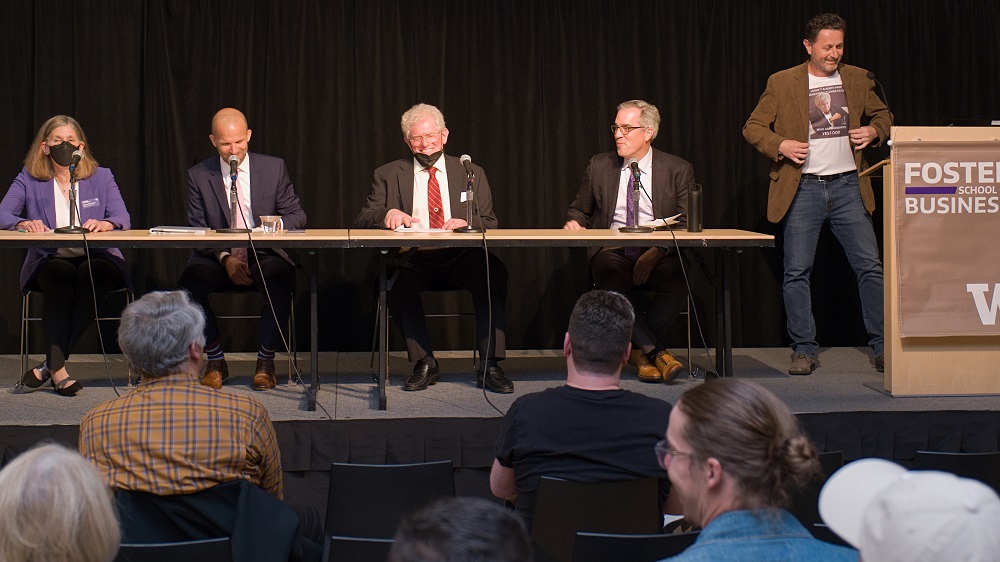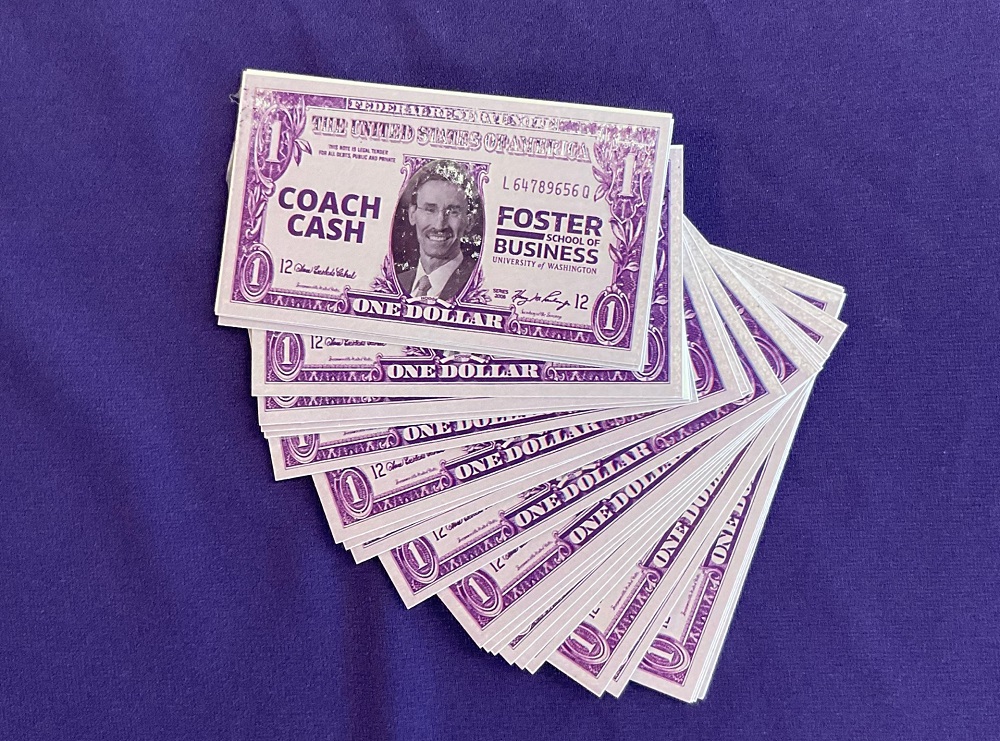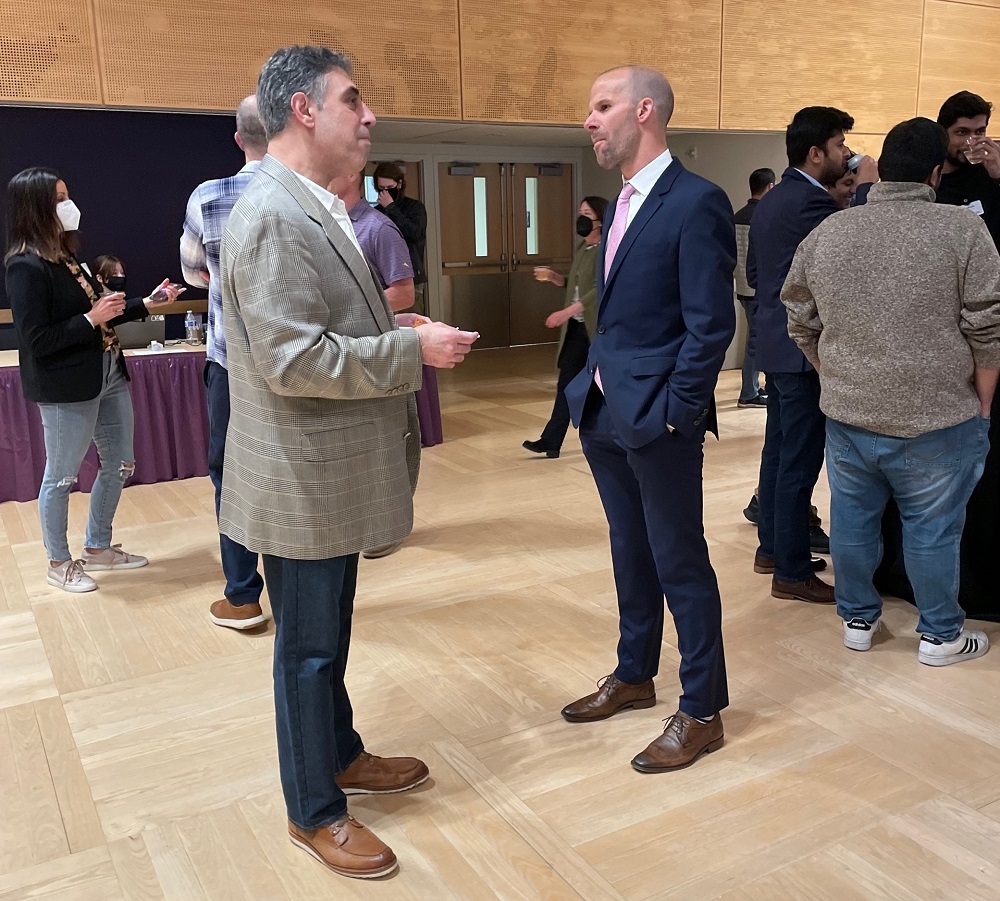At the State of the Economy Forum, the only thing certain is uncertainty
“I’m starting with uncertainty,” said Chris Mefford (MBA 2002) to open the Foster School’s annual State of the Economy Forum, April 26. “Is there any other place to start in 2022?”
Sure, we’ve seen a rapid economic recovery and robust—if uneven—growth, declining unemployment and rising wages, reported Mefford, the president and CEO of economic consulting firm Community Attributes, during his table-setting prelude. But a squall of economic headwinds is blowing in from the Russian invasion of Ukraine, a fractured global supply chain, acute labor shortages, raging inflation and fuel prices, and a peripatetic pandemic that refuses to die.
It all adds up to enormous economic uncertainty.
On hand to unpack what this might mean in the coming months was the familiar panel of Foster School experts. Mefford shared a physical stage, for the first time since COVID-19 arrived, with Debra Glassman, teaching professor of finance and business economics; Thomas Gilbert, associate professor of finance; Ed Rice, the William A. Alberts Endowed Professor of Finance and Business Economics—and emeritus since March.
As an appropriate roast/toast of the Foster School’s most iconic iconoclast on the occasion of his retirement, moderator Dennis Karlinsky (MBA 2001) and several longtime fans donned a limited edition t-shirt emblazoned with the beaming face of Rice framed in his own indelible meme: “I don’t always have something clever to say… Who am I kidding? Yes I do!”

Moderator Dennis Karlinsky (right) unveils the limited edition Ed Rice tribute shirt while amused panelists Debra Glassman, Thomas Gilbert, Rice and Chris Mefford look on.
Inflation. It’s a thing.
What followed was a conversation full of clever comments and learned insights to questions submitted by some of the 700 in attendance in-person or online. And, if not certainty, at least some context.
Inflation was first on the agenda. Glassman delivered a clinic on how the imbalance in the aggregate supply (supply chain woes) and aggregate demand (expansionary monetary and fiscal policy) has led to what may become persistent inflation. Gilbert noted that activity on the financial markets suggests that inflation may be persistent but not long-term. He also celebrated one of the causes of this inflation: significant wage growth for the first time in years. “Not every side of inflation is bad,” he said.
I wish all of us would pay less attention to posturing and more attention to people who are actually doing good things.”
-Ed Rice
Rice pinned inflation woes on two of his favorite gripes: too little global trade and too much government spending. The former is a result of a pandemic and war we could hardly prevent. But spending is “completely out of control,” he said, adding that government profligacy has become a bipartisan transgression. Democrats. Republicans. “Now everyone loves spending.”
He added that the rising wages that Gilbert mentioned aren’t keeping pace with prices.
“I see (inflation) as a much more serious problem than Thomas or Debra, and a continuous problem in the long term,” Rice said. “Isn’t this fun?”
What can the Fed do?
In response to soaring inflation, Gilbert said, the Federal Reserve has few weapons in its arsenal save for incremental interest rate hikes and a cessation of bond-buying. “The Fed cannot solve all problems,” he warned.
He predicted a possibly painful return to historic norms. With P/E ratios at dangerous levels, annual market returns will not remain at 15-20 percent. Mortgage rates will not see 2 percent again anytime soon. And the tight labor market will eventually loosen. “People need to wake up that what we’ve live the past decade is not normal,” Gilbert said.

The Fed may have to stop printing money to slow inflation, but Foster’s “coach cash” will still buy you a drink at the State of the Economy Forum.
Though its ability to move short-term interest rates may have limited effect on its own, Glassman argued that the Fed can also use psychological policy to signal where interest rates are headed (spoiler alert: up).
“This is a tricky balancing act,” she said. “(The Fed) would like to raise interest rates enough to slow down inflation, but not so much that we fall into recession. That is, they want a soft landing, not a hard landing.”
As do we all.
The Great Resignation: fact or fiction?
Despite a sober analysis of the American worker as endangered species by Gilbert that was picked up by the Daily Show (and screened at the forum), Mefford’s not buying it—at least not anymore. “I don’t believe the Great Resignation is a thing,” he declared. “Pants-optional at work is not a thing either, just because we’ve been living that way for two years.”
Mefford explained that people work for one of two reasons: because they want to or because they have to. Government stimulus, supplemental unemployment, less spending and more saving during the pandemic may have relieved the need to work for some. But only temporarily. “It’s a wonderful thing to be able to step back and reassess one’s career,” he added. “But I believe the Great Resignation is a moment in time that is passing before our eyes.”
Rice agreed, but couched the fleeting flight from work in his own inimitable way. “Jobs are not fun. People don’t like jobs. They only work for stuff… This ‘Great Resignation’ is about you can get stuff without working. Therefore, because jobs aren’t fun, people aren’t working.”
He also does not expect this trend to last, though, as a new retiree, he added that “you can have a good life in the basement playing video games.”
A serious challenge to globalization
Mefford admitted that the war in Ukraine has shaken the optimism he derived from his long-ago reading of Thomas Friedman’s 1999 best-seller, The Lexus and the Olive Tree, and it’s vision of a more peaceful world built upon the free exchange of goods and culture.
That idyll has been rattled by Putin’s invasion and its drastic global repercussions. “The word I have for it is unsettling,” Mefford said.
Gilbert noted how the war—plus a spike in COVID-19 that is hampering China’s economy—is straining the flow of goods and services around the world. “Supply chains are easy to break and hard to rebuild,” he said.
“Globalization has not prevented war,” Glassman added, “but globalization means we are all affected by war.”
Strains on the Russia/Ukraine region’s grain production and soaring oil prices add up to inflation everywhere.
Sanctions cut both ways
You can’t talk Russian aggression with considering sanctions. And though even Rice agreed that they are well warranted in this circumstance, he warned of hidden costs.
“The way the press talks about sanctions, it’s all upside,” he said. “It gives Russia pain and doesn’t affect us.”
He argued that sanctions, applied injudiciously, could tarnish the US reputation for protecting property—a huge reason we have become a global financial center.
He also worries about sanctions leading to a rift in the global economy, with one trading network forming around Russia and authoritarian nations and another around the US, Europe and other democracies. “I would recommend you all read the book 1984,” Rice said. “It portrays some of what that world might look like.
“Trade is a win-win proposition. The loss of trade would be huge potential loss to the United States and the whole world economy. When you impose sanctions, you have to do it right. I think arguably the Ukraine (sanctions) are right. But it’s not something you can do every other week.”
Corporations getting political
Rice and Gilbert sparred over the growing trend of corporations taking stands on political, social and environmental issues. Rice worried about the customer segmentation that could result.
Taking his case against market-splitting domestic, he imagined a United States where “the lefties only buy stuff from the lefty world, and the righties only buy stuff from the righty world. This would not be good for either lefties or righties.”
Gilbert argued that even the central doctrine of Milton Friedman, that fiercest of free marketers, can accommodate the modern notion of corporate social responsibility. “Some of this is not inconsistent with what Friedman wrote some decades ago,” he said. “There is a line, and we can discuss where that is.”
Crypto futures
All four panelists allowed that cryptocurrency has become a viable investment vehicle, with serious caveats.
Mefford asked why we don’t consider un-American these digital currencies that threaten to undercut the primacy of the US dollar and provide an unregulated means of financing criminal activity.
Gilbert puzzles at the valuations of crypto. “I still don’t understand what its expected future cash flows are,” he said. “Why does currency have value? Because we think tomorrow it will have value.”
Those crypto valuations can be sickeningly volatile. Glassman added that cryptocurrencies are purely speculative gambles for only the most adventurous investors. “Pro tip,” she offered. “The Bitcoin price always falls when I schedule a student presentation on the topic of cryptocurrency. The next one is coming up in the middle of May. Just saying…”
Parting thoughts
In a closing lightning round, Mefford reinforced his optimism about the region’s future. “I want to applaud companies that invest in their communities and lead in their communities,” he said. “This region truly can and does lead the world toward inclusive and sustainable prosperity. That needs to be led by private sector engagement.”
Gilbert proclaimed himself a proud “YIMBY” (yes in my back yard) who supports zoning changes that increase density and make room for a rapidly growing population in the Seattle region. “We are a growing city and we have to accept density,” he said.
Glassman, who does not usually lose sleep over future price hikes, predicted that “next year we’re still going to be talking about inflation. Expectations have inertia and policies take a long time to work.”
Rice got the last word—and made the most of it.
Claiming to learn “one thing a year,” he shared his insight on the salient distinction between “looking good and being good.” He castigated the growing tendency of people and organizations to trumpet unearned knowledge or unfounded virtue, citing the rampant performative postings on social media as a threat to the very fabric of civilization.
“I wish all of us would pay less attention to posturing,” he concluded, “and more attention to people who are actually doing good things.”



